|
|
Johann Friedrich Agricola (Organ, Composer, Writer, Copyist, Bach's Pupil) |
|
Born: January 4, 1720 - Dobitschen (Dobitz), near Altenburg, Saxony, Germany
Died: December 2, 1774 - Berlin, Germany |
|
Johann Friedrich Agricola was a German organist and composer of church music and of operas. His father, Johann Christoph Agricola, was a judge, and his mother, Maria Magdalen Manke, a friend of George Frideric Handel, He began to learn music in 1724, in his 5th year under the schoolmaster Johann Paul Martini in Dobitschen; and probably attended the Gymnasium (in Altenburg or Gera?). In 1738 he entered the University of Leipzig (enrollment on May 28, 1738) when Johann Christoph Gottsched was Professor of Rhetoric. But though he went through the regular course of 'humanities' he also studied music under J.S. Bach, with whom he worked hard for three years (1738-1741). After this he resided at Dresden and Berlin.
In 1741 Johann Friedrich Agricola went to Berlin, where he studied musical composition under Johann Joachim Quantz. He also studied there the dramatic style under Carl Heinrich Graun and Johann Adolph Hasse. He was soon generally recognized as one of the most skillful organists of his time. In 1749 he published two pamphlets on French and Italian taste in music under the pseudonym of Flavio Anicio Olibrio. The success of his comic opera, Il filosofo convinto in amore, performed at Potsdam in 1750, led to an appointment in 1751 as Hofkomponist (court composer) to Frederick the Great. He had an equal success with a second cantata, La Ricamatrice. He married the noted court operatic soprano Benedetta Emilia Molteni, despite the King's prohibition of court employees marrying each other. Because of this trespass, the king reduced Molteni's and Agricola's combined salaries to a single annual salary of 1,000 Thalers (Agricola's annual salary alone had been 1,500 Thalers). He composed various operas for Dresden and Berlin, as well as much music for the Church and many arrangements of the King's melodies. After the death of Carl Heinrich Graun (August 8, 1759) he was appointed conductor of the Königlichen Hofkapelle (Royal Court Chapel), but without the title of Roy. Hofkapellmeister, which the King withheld on account of his disapproval of Agricola's marriage. There he remained till his death (obituary in Vossische Zeitung).
Johann Friedrich Agricola's compositions had no permanent success, nor were any printed excepting two psalms and some chorales. He had the reputation of being the best organ-player in Berlin, and a good teacher of singing. He translated with much skill Tosi's Opinioni de' cantori, and made some additions to Jakob Adlung's Musica mechanica organœdi.
Johann Friedrich Agricola first reported in 1750 in his unsuccessful application for the Gotha court conductor post of three and a half years of piano and composition lessons with J.S. Bach. In addition, Agricola's visits to J.S. Bach's house in 1739 and 1741 are documented.
References: Koska: A-41; GND: GND: 118917382; Bach Digital: 00000331 |
|
Legacy |
|
Johann Friedrich Agricola wrote a number of Italian operas, as well as Lieder, chorale preludes, various other keyboard pieces and church music, especially oratorios and cantatas. His reputation chiefly rests, however, on his theoretical and critical writings on musical subjects.
Author
In 1754 he co-authored, with Carl Philipp Emanuel Bach, J.S. Bach's obituary. His 1757 Anleitung zur Singekunst (Introduction to the Art of Singing) is a translation of Pier Francesco Tosi's 1723 treatise Opinioni de' cantori antichi e moderni with Agricola's own extensive comments. He edited and added extensive commentary to the 1768 (posthumous) edition of Jakob Adlung's Musica mechanica organoedi. His annotations are considered an important source of information on J.S. Bach's views on the fortepiano designs of Gottfried Silbermann, on the lute-harpsichord, and on organ building.
Copyist
Agricola is also noted in J.S. Bach studies as one of the copyists for both books of the Well-Tempered Clavier (BWV 846-869; BWV 870-893) and the St. Matthew Passion (BWV 244).
Composer
Keyboard:
Ach, was soll ich Sünder machen
Jauchzet, ihr Erlösten dem Herren
Harpsicord Sonata in F major
Organ:
Jesu, meine Freude
Ein feste Burg ist unser Gott
Auf meinen lieben Gott
Erbarm dich mein, o Herre Gott
Es ist das Heil uns kommen her
Jauchzt, ihr Erlösten, dem Herren
O Ewigkeit, du Donnerwort
Herr, ich habe mißgehandelt
Herr Jesu Christ, ich weiß gar wohl
Wer nur den lieben Gott läßt walten
Ach, was soll ich Sünder machen
O Traurigkeit, o Herzeleid
Keinen hat Gott verlassen
Herzliebster Jesu, was hast du verbrochen
Freu dich sehr, o meine Seele
Ich hab mein Sach Gott heimgestellt
Chamber Works:
Flute Sonata in A major
Vocal Works:
A la mignonne de fortune (song)
L'accorto nocchiero (aria)
Canzonetta, Les Rois d'Égypte
6 Canzonettes
Cleofide
Torna aprile e l'aure scherzano (aria)
Choral Works:
Die Hirten bei der Krippe, cantata for 4 voices, chorus & orchestra
Kündlich gross ist das gottselige Geheimnis, cantata for 4 voices, chorus & orchestra
Uns ist ein Kind geboren, cantata for 4 voices, chorus & orchestra
Die Hirten bey der Krippe zu Bethlehem, sacred cantata
Der König jauchzt, sacred cantata
Il tempio d'amore, serenata
Magnificat in D major
Opera:
Alessandro nell'Indie (1754)
Achille in Sciro (1765)
L'Ippocondriaco |
|
Works of Bach he copied [Manuscript No. in Bach Digital / Work / Performance date] |
|
B-Bc 11600 FRW
D-B Am.B 6
D-B Am.B 22
D-B Am.B 33-35, Faszikel 1
D-B Am.B 33-35, Faszikel 2
D-B Am.B 33-35, Faszikel 3
D-B Am.B 37-38, Faszikel 1
D-B Am.B 37-38, Faszikel 2
D-B Am.B 58
D-B Am.B 62
D-B Am.B 63
D-B Am.B 67
D-B Am.B 68
D-B Am.B 69
D-B Am.B 73, Faszikel 3
D-B Am.B 100
D-B Am.B 489
D-B Am.B 536-537, Faszikel 1
D-B Am.B 536-537, Faszikel 2
D-B Am.B 538-540, Faszikel 1
D-B Am.B 538-540, Faszikel 2
D-B Am.B 538-540, Faszikel 3
D-B Am.B 542
D-B Am.B 553, Faszikel 4
D-B Am.B 556-557, Faszikel 1
D-B Am.B 556-557, Faszikel 2
D-Bhm 6138/21, Faszikel 1a
D-Bhm 6138/21, Faszikel 1b
D-Bhm 6138/21, Faszikel 2
D-B Mus.ms. Bach P 26, Faszikel 1
D-B Mus.ms. Bach P 202[Original source]
D-B Mus.ms. Bach P 249
D-B Mus.ms. Bach P 349 [Konvolut][Original source]
D-B Mus.ms. Bach P 349, Faszikel 3[Original source]
D-B Mus.ms. Bach P 400b
D-B Mus.ms. Bach P 400c
D-B Mus.ms. Bach P 480
D-B Mus.ms. Bach P 533
D-B Mus.ms. Bach P 595, Faszikel 5
D-B Mus.ms. Bach P 598
D-B Mus.ms. Bach P 650
D-B Mus.ms. Bach P 651
D-B Mus.ms. Bach P 667
D-B Mus.ms. Bach P 679
D-Bsa SA 567
D-Bsa SA 1611, Faszikel 15
D-Bsa SA 2582, Faszikel 1
D-Bsa SA 2601
D-Bsa SA 2615, Faszikel 1
D-Bsa SA 2621, Faszikel 1
D-Bsa SA 2623, Faszikel 1
D-Bsa SA 2630
D-Bsa SA 3287[Original source]
D-Bsa SA 3627 [Konvolut]
D-Bsa SA 3627, Faszikel 7
D-B Mus.ms. Bach St 76[Original source]
D-B Mus.ms. Bach St 140, Faszikel 1
D-B Mus.ms. Bach St 141
D-GOl Mus. 2° 54c/3
D-LEb Peters Ms. R 11a (Depositum im Bach-Archiv)
D-LEb Peters Ms. R 16, Faszikel 4 (Depositum im Bach-Archiv)
Verschollen BWV 111 (1), J. F. Agricola |
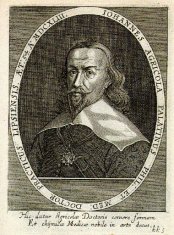 |
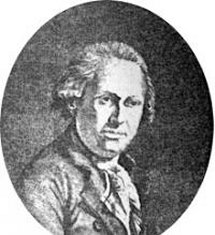
|
|
Portrait (1720) [01] |
Portrait [02] |

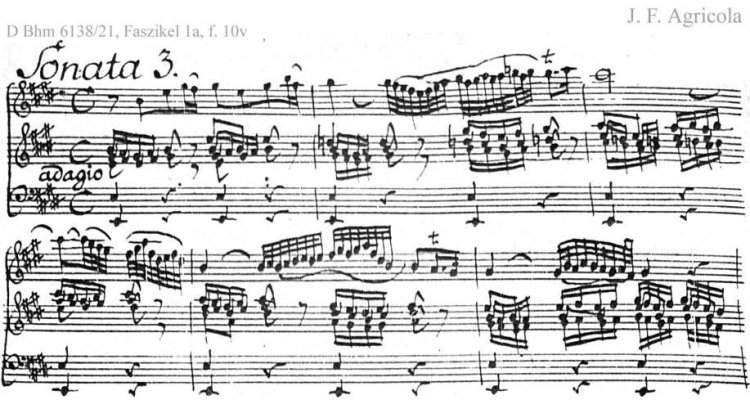
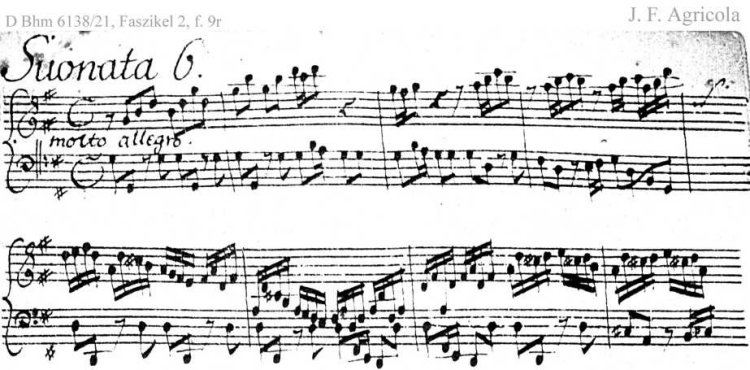
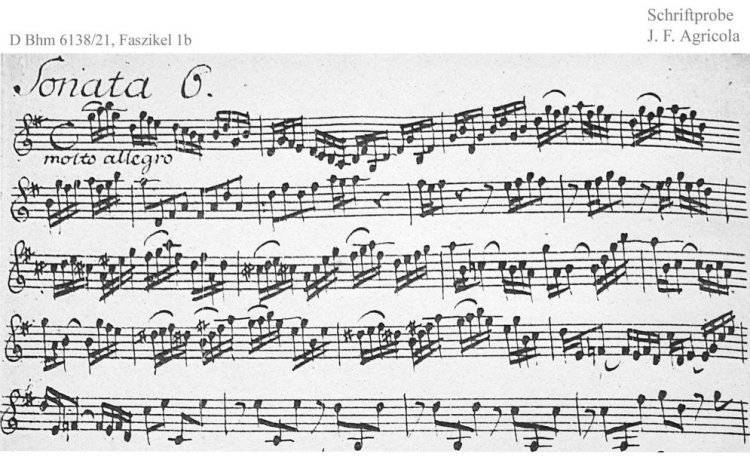 |
|
Specimens of Johann Friedrich Agricola handwriting (Bach Digital) [HW-01/04] |
|
Sources:
1. Grove’s Dictionary of Music and Musicians (1952 Edition, by D. Franz Gehring)
2. Bernd Koska: Dissertation "Bachs Thomaner als Kantoren in Mitteldeutschland" (Beeskow 2018), Anhang VII.1 Die Alumnen der Thomasschule 1710-1760, English translation by Aryeh Oron (May 2020)
3. Wikipedia Website (May 2020)
4. Bach Digital Website (January 2020)
Contributed by Aryeh Oron (January 2006, May 2020) |
|
Links to other Sites |
|
Johann Friedrich Agricola (Wikipedia)
HOASM: Johann Friedrich Agricola
Johann Friedrich Agricola (biography .ms)
Reference.com: Johann Friedrich Agricola
Johann Friedrich Agricola (Answers.com)
Johann Friedrich Agricola (AllExperts)
Agricola, Johann Friedrich (Bach Digital) |
|
Bibliography |
|
Sources: Dok II, Nr. 596; Dok VII, S. 55; Löffler 1929/31, Nr. 41; Löffler 1936, S. 117; Löffler 1953, Nr. 57; LBB 3 (E. Odrich/P. Wollny), S. 116f., 181; MGGo; NBA IX/3, Nr. 216 |
|
|